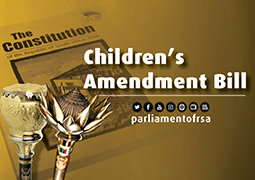
There was a general sigh of relief from numerous fathers who have been fighting for access to their children after divorce or separation. The fathers aired their views to the Portfolio Committee on Social Development during public hearings on the Children’s Amendment Bill in KwaXimba, KwaZulu-Natal.
The committee is on a nationwide public-hearing process to gather the views of South Africans on the amendments, which are intended to ensure the protection of the rights and lives of children.
Mr John Govender* from Fathers 4 Justice, a support group for fathers experiencing alienation from their children, says while they want to be part of their children’s lives the judicial system makes this difficult. “Children are being used as pawns, by both men and women, in the divorce proceedings. We are not pro-fathers-only or pro-mothers-only, we are pro-parenting- and pro-children-only,” Mr Govender explained.
Most of the fathers taking part in the hearings had individual heart-wrenching stories of how they have been denied the opportunity to be active participants in the lives of their children. Most of them said they supported the Amendment Bill, primarily because it presents them the opportunity to care for their children.
The justice system was criticised for its perceived adversarial relationship with fathers, with a strong preference for mothers over fathers when it comes to the care of children. “The justice system is heavily biased against the father. We are in a virtual cycle where fathers want to be there, but the system prevents them from realising this objective,” said Mr Ravi Maharaj*.
Meanwhile, early childhood practitioners also supported strengthening fathers’ rights, highlighting the positive impact the presence of two parents has on children and their development. Ms Nomusa Jali was one such supporter. “I personally support the equal rights of parents. The critical role of the father cannot be replaced and it makes it easy when educators work with both parents,” Ms Jali said.
Regarding early childhood development centres (ECDs), participants were critical of the lack of minimum standards in teaching and learning within the ECD environment, as this disadvantages children from rural areas. Participants called for uniformity in standards to ensure that all children have access to equal education and development. Another call was made for the establishment of a minimum entry-level qualification for ECD practitioners.
Lack of infrastructure development was also underscored as a critical challenge affecting the effective functioning of ECDs. A call was made for all spheres of government should make funds available for this purpose.
The committee will from Friday, 25 November, conduct more public hearings on the Amendment Bill in Gauteng.
* Some names have been changed.
Malatswa Molepo
24 November 2021

